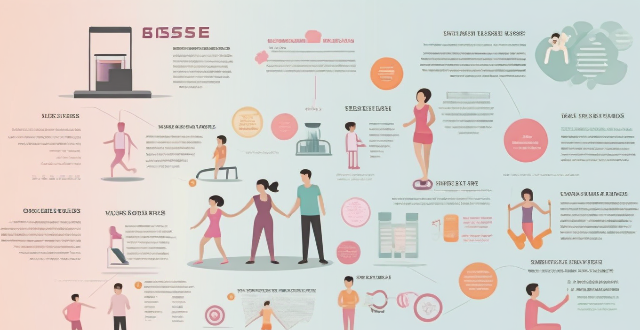Care Chronic

What are some effective strategies for managing chronic conditions as part of personal health care ?
Managing chronic conditions requires a combination of self-care, education, lifestyle changes, and support from others. Developing a self-care plan, educating yourself about your condition, making healthy lifestyle choices, and seeking support from family and friends are all effective strategies for managing chronic conditions. By taking an active role in managing your symptoms and communicating effectively with your healthcare team, you can improve your overall quality of life and reduce the impact of your condition on your daily activities.

What is the difference between acute and chronic conditions in first aid ?
The article discusses the difference between acute and chronic conditions in first aid, highlighting key points to remember for each type. Acute conditions are sudden, severe, and short-term, often requiring immediate action and potentially lifesaving interventions. Examples include heart attack, stroke, severe allergic reactions, fractures or dislocations, poisoning, severe burns or scalds, and severe bleeding or shock. Key points to remember for acute conditions are to act quickly, call for help, and stabilize the patient while waiting for professional medical assistance. Chronic conditions, on the other hand, are long-term health problems that persist over time and often require ongoing management rather than urgent intervention. Examples include diabetes, asthma, high blood pressure, arthritis, COPD, migraines, and epilepsy. Key points to remember for chronic conditions are to know the patient's history, monitor symptoms, seek medical advice, and educate yourself about the specific condition. In summary, understanding the differences between acute and chronic conditions is essential when providing first aid to ensure appropriate care is given based on the nature of the condition.

How does telemedicine improve patient care and access to health services ?
Telemedicine improves patient care and access to health services by increasing accessibility for both rural and urban patients, enhancing continuity of care, offering cost efficiency, providing a better patient experience through personalized care and convenience, and enabling data-driven decision making.

Can wearable technology effectively monitor chronic health conditions ?
Wearable technology shows potential in monitoring chronic health conditions by providing real-time data on health metrics. However, accuracy, data overload, and privacy concerns are limitations to consider. It should be used in conjunction with other forms of healthcare monitoring for effective management of chronic conditions.

What are the consequences of chronic procrastination ?
Procrastination is a common behavioral pattern where individuals delay or put off tasks until the last minute. While occasional procrastination may not cause significant harm, chronic procrastination can lead to various negative consequences. In this article, we will discuss the potential effects of persistent procrastination on an individual's life. Chronic procrastination often results in increased stress levels due to the accumulation of unfinished tasks and deadline pressures. Procrastination leads to poor time management skills, as individuals tend to underestimate the time required to complete tasks. Chronic procrastination can also have a negative impact on an individual's self-efficacy, or their belief in their ability to succeed. Procrastination can strain personal relationships, both professionally and personally. Colleagues and friends may become frustrated with the individual's lack of commitment and follow-through, leading to conflicts and misunderstandings. In academic settings, chronic procrastination can lead to poor grades and missed opportunities for learning. Similarly, in professional environments, consistent procrastination can hinder career advancement and limit job opportunities. Chronic stress from procrastination can take a toll on an individual's physical health. The constant pressure and anxiety associated with procrastination can contribute to issues such as headaches, digestive problems, and weakened immune function.

Do sports rehabilitation centers offer preventative care to avoid future injuries ?
Sports rehabilitation centers play a crucial role in offering preventative care services to help individuals avoid future injuries. They provide comprehensive assessments, customized exercise programs, education and training, utilize advanced equipment and technology, and collaborate with healthcare professionals to improve overall health and reduce the risk of re-injury.

Can exercise reverse or slow the progression of existing chronic diseases ?
**Can Exercise Reverse or Slow the Progression of Existing Chronic Diseases?** Chronic diseases like diabetes, heart disease, and cancer often require lifelong management. Many wonder if exercise can play a role in mitigating these conditions. This discussion explores the potential benefits of physical activity for those with chronic illnesses. **Benefits of Exercise for Chronic Diseases:** - **Cardiovascular Disease**: Improved blood pressure, reduced risk of heart attack, enhanced lipid profile. - **Diabetes**: Better blood sugar control, aid in weight management, reduced complications. - **Cancer**: Improved quality of life, reduced fatigue, potentially better survival rates. **How Exercise Contributes to These Benefits:** - Increased blood flow ensures better organ oxygenation and nutrient delivery. - Anti-inflammatory effects alleviate symptoms of chronic diseases. - Boosted immune function helps fight infections and potentially cancer cells. **Implementing an Exercise Program:** - **Consultation**: Always consult your healthcare provider before starting. - **Gradual Progression**: Start slowly and build up over time. - **Balanced Routine**: Include cardio, strength training, and flexibility exercises. - **Monitoring Response**: Track how your body responds to different exercises. **Conclusion:** While exercise might not reverse chronic diseases outright, it significantly slows their progression and enhances well-being. Tailoring an exercise program under medical guidance allows those with chronic conditions to actively manage their health, improving their quality of life.

Is it true that exercise can help manage chronic pain conditions ?
Exercise can help manage chronic pain conditions by reducing pain intensity, improving physical function, enhancing quality of life, and increasing energy levels. It is important to consult with a healthcare professional before starting any exercise program and to start slowly, gradually increasing intensity over time while listening to your body's responses.

How much exercise is needed per week to prevent chronic disease ?
Chronic diseases are a major cause of death and disability worldwide. Regular physical activity can help reduce the risk of developing chronic diseases such as heart disease, diabetes, and some types of cancer. According to the World Health Organization (WHO), adults should aim to do at least 150 minutes of moderate-intensity aerobic exercise or 75 minutes of vigorous-intensity aerobic exercise each week, along with muscle-strengthening activities at least twice a week. However, the amount of exercise needed to prevent chronic diseases may vary depending on individual factors such as age, sex, body weight, and overall health status. It's recommended that people try to incorporate at least 30 minutes of moderate-intensity aerobic exercise into their daily routine, along with strength training exercises whenever possible.

How can sedentary lifestyles contribute to the development of chronic conditions ?
Sedentary lifestyles, characterized by prolonged periods of inactivity or sitting, have become increasingly common in modern society. This shift from active to passive living has significant implications for health, contributing to the development of a range of chronic conditions such as metabolic disorders, cardiovascular diseases, musculoskeletal issues, and other health concerns. To mitigate these effects, regular exercise, active commuting, workplace interventions, and lifestyle changes are recommended.

Does high-intensity interval training (HIIT) have specific benefits for chronic disease prevention ?
High-intensity interval training (HIIT) offers numerous benefits for chronic disease prevention, including improved cardiovascular health, enhanced glucose control, reduced inflammation, increased muscle mass and strength, and improved mental health outcomes. To incorporate HIIT into a healthy lifestyle, start slowly, choose the right exercises, include other forms of exercise, and consult with a health professional.

How do I provide care for someone experiencing anaphylactic shock ?
Anaphylactic shock is a severe allergic reaction that requires immediate care. To provide care for someone experiencing it, recognize the symptoms like skin reactions and respiratory distress, call for emergency help, use an epinephrine auto-injector if available, position the person comfortably, loosen tight clothing, keep them calm, monitor vital signs, and follow instructions from emergency personnel. Timely action can greatly improve the chances of recovery.

Can exercise physiology be used to treat chronic diseases like diabetes and hypertension ?
Exercise physiology can be effectively used to treat chronic diseases like diabetes and hypertension by improving blood sugar control, aiding in weight management, reducing blood pressure, and enhancing cardiovascular health. Individualized exercise programs, education on lifestyle modifications, and consistent support from professionals contribute to better disease management and overall well-being.

How do I care for and maintain my luxury purchases ?
This guide offers comprehensive advice on how to care for various luxury items, including designer handbags, fine jewelry, high-end watches, leather goods, and shoes/apparel. It emphasizes the importance of following manufacturer's instructions, proper storage, gentle handling, regular maintenance, and insurance. Specific tips are provided for each type of luxury item, such as cleaning methods, protection against water damage, and professional check-ups. The guide also suggests avoiding harsh chemicals, focusing on quality over quantity, and seeking professional help for specialized care. By implementing these strategies, individuals can maintain the beauty and functionality of their luxury purchases for years to come.

How can older adults with chronic conditions incorporate exercise into their daily routine ?
Incorporating exercise into the daily routine of older adults with chronic conditions is crucial for maintaining their overall health and well-being. Here are some tips on how they can achieve this: * Start slowly by gradually increasing the duration and intensity of low-impact exercises like walking or swimming. * Choose appropriate exercises that focus on strength training, flexibility, and range of motion to reduce the risk of injury. * Set realistic short-term and long-term goals to build momentum and confidence. * Make exercise a habit by scheduling specific times during the day and creating a routine. * Stay safe and comfortable by wearing appropriate gear, staying hydrated, and seeking professional advice when needed. * Track progress in a journal and celebrate milestones to stay motivated.

How to care for and maintain your sports fashion garments ?
Sporting fashion garments are designed to be both stylish and functional, but they also require special care to maintain their quality and appearance. Here are some tips on how to properly care for and maintain your sports fashion garments: Washing instructions include reading the label, sorting clothes, using a gentle detergent, hand washing or machine washing on delicate cycle, and avoiding tumble drying. Maintenance tips include storing properly, avoiding ironing, spot cleaning stains, rotating garments, and repairing tears and holes. By following these care and maintenance tips, you can extend the lifespan of your sports fashion garments and keep them looking their best for years to come.

How are robotics changing surgery and patient care in hospitals ?
The integration of robotics in hospitals is revolutionizing surgery and patient care by enhancing precision, reducing recovery time, increasing accessibility to specialized care, improving training and education, streamlining operations, and fostering personalized medicine. Robotic-assisted surgery offers greater accuracy and minimally invasive techniques, leading to quicker healing and less trauma for patients. Telerobotic surgery expands access to expert care across geographical barriers. Simulation technologies provide a safe environment for surgical practice and the development of new techniques. Automation improves hospital efficiency, from dispensing systems to record management. Personalized medicine is facilitated through customized treatment plans tailored to individual patient needs. Overall, robotics is transforming healthcare delivery, making it more efficient, effective, and accessible.

Are there any natural or organic feminine care products available in the market ?
Natural and organic feminine care products have become increasingly popular as consumers seek gentler, chemical-free options for their personal hygiene. These products include natural deodorants, organic tampons and pads, shampoos and soaps made with plant-based ingredients, herbal remedies for menstrual pain relief, dietary supplements to support hormonal balance, and skincare solutions for feminine areas. By choosing these products, individuals can prioritize their health while also supporting sustainable practices in the beauty industry.

What role does access to healthcare play in mitigating the health effects of climate change ?
The text discusses the role of healthcare accessibility in mitigating the health effects of climate change. It highlights the importance of preventive care, emergency response, and chronic disease management in reducing vulnerability to climate-related health risks. The text also explores direct and indirect effects of climate change on human health, such as heat-related illnesses, respiratory issues, vector-borne diseases, mental health impacts, nutritional impacts, and displacement and migration. Finally, it suggests adaptation strategies for healthcare systems, including building resilient infrastructure, integrating climate change considerations into public health systems, and training community health workers on climate change impacts.

How does predictive analytics help in disease prevention and management within the healthcare system ?
Predictive analytics in healthcare can significantly improve disease prevention and management by identifying patterns and trends in patient data. It offers benefits such as early intervention, personalized treatment plans, enhanced operational efficiency, and informed decision-making. Applications include disease surveillance, chronic disease management, and patient care optimization. However, challenges like data privacy, quality, and the need for skilled data analysts must be addressed to fully realize its potential.

How can sports medicine help athletes manage chronic conditions such as asthma or diabetes ?
Sports medicine aids athletes with chronic conditions like asthma or diabetes by offering education, personalized treatment plans, environmental controls, dietary management, medication oversight, and psychological support to ensure they can safely continue their sports activities.

How can women ensure they have access to medical care and support in case of illness or injury while traveling ?
How Can Women Ensure They Have Access to Medical Care and Support in Case of Illness or Injury While Traveling? Traveling can be an exciting adventure, but it's important to ensure that you have access to medical care and support in case of illness or injury. Here are some tips for women to ensure they have access to medical care while traveling: 1. Research Before You Go: Before embarking on your journey, research the local healthcare system and facilities. Look for hospitals, clinics, and pharmacies in the area you will be visiting. Make a list of emergency numbers and keep them with you at all times. 2. Get Travel Insurance: Consider purchasing travel insurance that includes medical coverage. This will give you peace of mind knowing that you are covered in case of an unexpected illness or injury. 3. Pack a First Aid Kit: Pack a first aid kit with essential items such as bandages, antiseptic wipes, pain relievers, and any prescription medications you may need. It's also a good idea to bring along copies of your prescriptions in case you need to refill them while traveling. 4. Stay Healthy: Take steps to stay healthy while traveling. Wash your hands frequently, eat nutritious meals, drink plenty of water, and get enough sleep. Avoid risky behaviors such as excessive alcohol consumption or participating in dangerous activities without proper safety gear. 5. Seek Help When Needed: If you do become ill or injured while traveling, don't hesitate to seek medical attention. Many countries have English-speaking doctors and nurses who can provide assistance. If you are unable to communicate effectively with local healthcare providers, consider using translation services or seeking out expatriate communities for support. In conclusion, ensuring access to medical care and support while traveling is crucial for women's health and safety. By doing your research beforehand, getting travel insurance, packing a first aid kit, staying healthy, and seeking help when needed, you can enjoy your travels with peace of mind knowing that you are prepared for any potential emergencies.

How can we reduce the burden of non-communicable diseases worldwide ?
Non-communicable diseases (NCDs) account for 71% of global deaths, including cardiovascular diseases, cancers, chronic respiratory diseases, and diabetes. Reducing their burden is essential for better health outcomes and lower healthcare costs. Key strategies include promoting healthy lifestyles, early detection, media campaigns, tobacco control policies, alcohol taxation, sugar taxes, strengthening primary care, training health professionals, integrated care models, funding research, digital health solutions, pharmaceutical innovation, international cooperation, public-private partnerships, community engagement, increased funding, insurance coverage, and cost-effective interventions. These measures require collaboration from governments, civil society, the private sector, and individuals to foster a supportive environment for good health and assist those with NCDs.

What are the benefits of regular exercise on personal health ?
Regular exercise is crucial for maintaining good health and preventing chronic diseases. It improves cardiovascular health, aids in weight management, increases muscle strength and endurance, enhances mental health, improves sleep quality, and reduces the risk of chronic diseases. Incorporating physical activity into your daily routine can significantly improve your overall quality of life.

How has the COVID-19 pandemic affected global health ?
The COVID-19 pandemic has significantly impacted global health by increasing infection and mortality rates, straining healthcare systems, causing mental health concerns, affecting healthcare economics, prompting public health policies and responses, and potentially causing long-term effects.

What happens if I get injured while playing sports and don't have insurance ?
Injuries are a common occurrence in sports, and they can range from minor to severe. When you get injured while playing sports, the first thing that comes to mind is seeking medical attention. However, what happens if you don't have insurance? This article will explore the consequences of not having insurance when you get injured while playing sports. If you get injured while playing sports and don't have insurance, you will be responsible for paying all the medical expenses out of pocket. This can include doctor visits, hospital stays, surgery, physical therapy, and medication. Depending on the severity of the injury, these expenses can add up quickly and become a financial burden. Without insurance, you may have limited access to healthcare providers. Some doctors and hospitals may refuse to treat patients without insurance or may require upfront payment for services rendered. This can delay treatment and potentially worsen your condition. If your injury occurs during a team sport or an organized event, there may be legal implications if you don't have insurance. The organizers or other players may hold you liable for any damages or injuries that occur during the game. This can result in lawsuits and legal fees. Not having insurance can also have long-term effects on your health and well-being. If you cannot afford proper medical care or physical therapy, your injury may not heal properly, leading to chronic pain or disability. This can impact your ability to work or participate in activities you enjoy. The best way to avoid these consequences is to get insurance coverage. There are various types of insurance policies available, including health insurance, accident insurance, and sports-specific insurance. Research and compare different policies to find one that meets your needs and budget. Another way to reduce the risk of injury is to participate in low-risk sports or activities. Choose sports that are less likely to cause severe injuries, such as swimming or cycling, instead of contact sports like football or rugby. Wearing protective gear can also help prevent injuries while playing sports. Make sure to wear appropriate gear such as helmets, pads, and mouthguards when participating in high-risk activities. If you do get injured while playing sports, seek medical attention promptly even if you don't have insurance. Some healthcare providers offer payment plans or sliding scale fees based on income, which can help alleviate some of the financial burden associated with receiving medical care. In conclusion, getting injured while playing sports without insurance can have serious consequences, including high medical expenses, limited access to healthcare, legal liability, and long-term effects on your health and well-being. To avoid these consequences, it is important to get insurance coverage, participate in low-risk sports, use protective gear, and seek medical attention promptly if needed.

How does regular exercise contribute to the prevention of chronic diseases ?
Regular exercise is essential for preventing chronic diseases by improving cardiovascular health, managing weight, and promoting mental health benefits. It strengthens the heart, lowers blood pressure, reduces cholesterol levels, burns calories, increases metabolism, improves insulin sensitivity, reduces stress and anxiety symptoms, improves sleep quality, and reduces depression symptoms. Incorporating regular exercise into your daily routine can provide long-term health benefits beyond physical fitness alone.

What role does muscle strength training play in preventing chronic diseases ?
Muscle strength training can help prevent chronic diseases such as heart disease, stroke, type 2 diabetes, and some types of cancer. It also has many benefits for physical and mental health, including improved cardiovascular health, weight management, better bone health, reduced risk of type 2 diabetes, enhanced mental health, increased self-esteem, improved physical function, lowered blood pressure, and cancer prevention. To get started with muscle strength training, it is important to start low and slow, mix up your routine, rest enough, stay hydrated, eat right, and get enough sleep. With dedication and consistency, you can achieve great results!